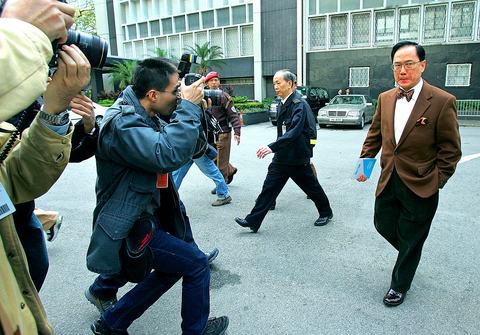Hong Kong Chief Executive Tung Chee-hwa (董建華) huddled behind closed doors yesterday with three cabinet members -- including an official rumored to be his successor -- amid intense speculation that the unpopular politician would soon quit with two years left in his term.
The officials refused to talk to the media, and the weeklong political drama over Tung's future showed few clear signs of ending.
The resignation rumors have been partly fueled by Tung, who has repeatedly declined to assure the public he's staying. He has only said he would address the issue at the "appropriate time."

PHOTO: AP
Many of Tung's critics have said that the ongoing political uncertainty and lack of transparency could damage Hong Kong.
Those meeting with Tung yesterday included those who could be reshuffled if Tung steps down: Chief Secretary for Administration Donald Tsang (曾蔭權), Financial Secretary Henry Tang (唐英年) and Secretary for Commerce, Industry and Technology John Tsang (曾俊華).
Donald Tsang's spokesman Donald Chen confirmed the official met with Tung but declined to give details.
The spokeswoman for the commerce secretary, Diana To, said she didn't know what was discussed at the meeting but called it an "ordinary" gathering.
Spokesmen for Tung and Tang declined to confirm the meeting.
Tung's movements have been scrutinized by the local media since he returned from Beijing on Sunday after meeting with his bosses -- Chinese President Hu Jintao (胡錦濤) and Premier Wen Jiabao (溫家寶). The media described the trip as a farewell tour for Tung.
If Tung quits, Donald Tsang -- the No. 2 ranking official -- will replace him until a new leader, or chief executive, is elected by an 800-member election committee. Hong Kong voters can't directly elect their leader.
Tung also met with Donald Tsang on Sunday after his return, but government spokesman Victor Cheung said Tsang briefed Tung on happenings in Hong Kong when Tsang served as acting leader during his absence.
Speculation of Tung's departure intensified more than a week ago when the leader was named to the Chinese People's Political Consultative Conference, a top advisory body to the China's legislature. He reportedly will be appointed one of the group's vice chairmen -- a title usually given to retired leaders.
Tung has had a troubled tenure since becoming leader of this former British colony when it returned to Chinese rule in 1997.
Many view him as incompetent, alleging his government didn't tackle Hong Kong's economic woes and the outbreak of severe acute respiratory syndrome in 2003. Tung is also seen as China's local puppet in not allowing greater democracy.
In the lowest point of his rule, half a million upset at an anti-subversion bill viewed as draconian marched in protest on July 1, 2003. The bill was later shelved.

MONEY GRAB: People were rushing to collect bills scattered on the ground after the plane transporting money crashed, which an official said hindered rescue efforts A cargo plane carrying money on Friday crashed near Bolivia’s capital, damaging about a dozen vehicles on highway, scattering bills on the ground and leaving at least 15 people dead and others injured, an official said. Bolivian Minister of Defense Marcelo Salinas said the Hercules C-130 plane was transporting newly printed Bolivian currency when it “landed and veered off the runway” at an airport in El Alto, a city adjacent to La Paz, before ending up in a nearby field. Firefighters managed to put out the flames that engulfed the aircraft. Fire chief Pavel Tovar said at least 15 people died, but

LIKE FATHER, LIKE DAUGHTER: By showing Ju-ae’s ability to handle a weapon, the photos ‘suggest she is indeed receiving training as a successor,’ an academic said North Korea on Saturday released a rare image of leader Kim Jong-un’s teenage daughter firing a rifle at a shooting range, adding to speculation that she is being groomed as his successor. Kim’s daughter, Ju-ae, has long been seen as the next in line to rule the secretive, nuclear-armed state, and took part in a string of recent high-profile outings, including last week’s military parade marking the closing stages of North Korea’s key party congress. Pyongyang’s official Korean Central News Agency (KCNA) released a photo of Ju-ae shooting a rifle at an outdoor shooting range, peering through a rifle scope

South Korea would soon no longer be one of the few countries where Google Maps does not work properly, after its security-conscious government reversed a two-decade stance to approve the export of high-precision map data to overseas servers. The approval was made “on the condition that strict security requirements are met,” the South Korean Ministry of Land, Infrastructure and Transport said. Those conditions include blurring military and other sensitive security-related facilities, as well as restricting longitude and latitude coordinates for South Korean territory on products such as Google Maps and Google Earth, it said. The decision is expected to hurt Naver and Kakao

India and Canada yesterday reached a string of agreements, including on critical mineral cooperation and a “landmark” uranium supply deal for nuclear power, the countries’ leaders said in New Delhi. The pacts, which also covered technology and promoting the use of renewable energy, were announced after Indian Prime Minister Narendra Modi and Canadian Prime Minister Mark Carney hailed a fresh start in the relationship between their nations. “Our ties have seen a new energy, mutual trust and positivity,” Modi said. Carney’s visit is a key step forward in ties that effectively collapsed in 2023 after Ottawa accused New Delhi